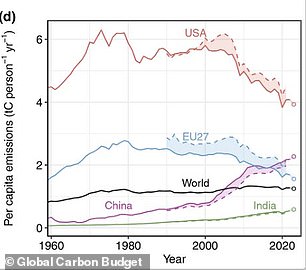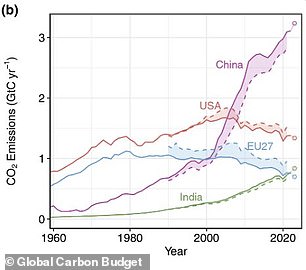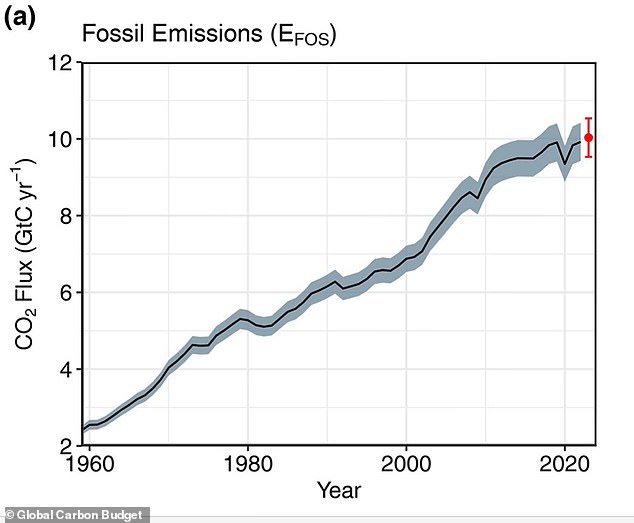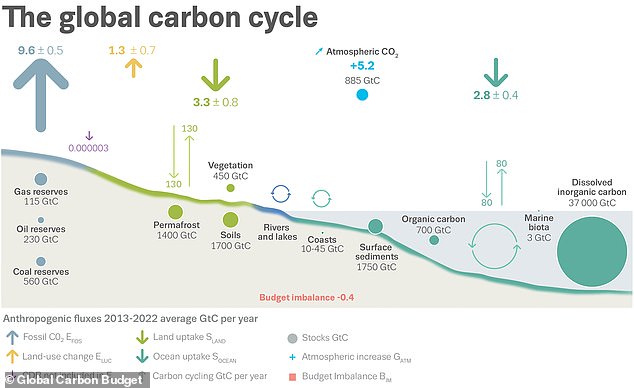Global carbon emissions from fossil fuels are at a record HIGH – with 36.8 billion tonnes emitted in 2023, study warns
A new report reveals that global carbon emissions will reach their highest levels ever in 2023.
Scientists from the Global Carbon Budget Project found that 36.8 billion tons of carbon dioxide were released into the atmosphere this year – an increase of 1.1 percent compared to last year.
Experts say that to avoid the worst effects of climate change, emissions must be cut by a whopping 8.9 per cent each year.
Lead researcher, Professor Pierre Friedlingstein, says efforts to reduce emissions have been “painfully slow”.
Scientists now believe that global warming of more than 1.5 degrees Celsius (2.7 degrees Fahrenheit) is almost inevitable.
A report from the Global Carbon Budget revealed that global carbon emissions reached an all-time high in 2023, with 36.8 billion tons emitted.
Even as world leaders meet to discuss climate change at the United Nations Climate Change Conference (COP28), the study found that emissions from fossil fuels are rising year after year.
However, the total increase was not evenly distributed across the world.
The largest overall increases came from India and China, where carbon emissions rose by 8.2 percent and four percent, respectively.
But in the European Union, total emissions actually fell by 7.4 percent compared to the previous year.
Emissions have also begun to slowly decline in the United States, where the amount of carbon dioxide emitted has fallen by three percent.
A recent study showed that annual emissions in the UK fell by around three per cent, largely due to reduced coal use.


The United States still leads the world in terms of carbon dioxide emissions per person, despite efforts to reduce total emissions, while India and China continue to increase their total carbon emissions.
Despite hopes that global efforts would lead to lower carbon emissions, researchers found that levels are still rising steadily.
While the Covid-19 pandemic has caused emissions to fall slightly, the amount of carbon dioxide emitted this year is now 1.4 percent higher than pre-pandemic levels.
Professor Friedlingstein, from the University of Exeter, who led the study, said: “It now seems inevitable that we will exceed the 1.5°C target in the Paris Agreement.”
“Leaders meeting at COP28 will have to agree on rapid cuts in fossil fuel emissions even to maintain the 2°C target.”
Researchers now estimate that there is a 50% chance that global warming will exceed 1.5 degrees Celsius (2.7 degrees Fahrenheit) consistently over the next seven years.

Despite hopes that global efforts will reduce emissions, the study found that carbon dioxide from burning fossil fuels has stabilized, not decreased.

In order to bring the carbon cycle back into balance, the amount of carbon dioxide emissions from burning fossil fuels must be reduced to a point at which they can be offset by carbon capture.
The study found that although about half of the world's emissions are absorbed by “carbon sinks” in oceans and forests, this cannot offset the overall increase.
Forests and plankton in the oceans absorb carbon from the atmosphere through photosynthesis.
However, when forests are destroyed through natural events or through human activity, carbon is released back into the atmosphere.
Emissions from land-use change, including deforestation, fell slightly but not low enough to be offset by the number of forests planted or restored.
Including emissions from land-use change in the total, global emissions reach 40.9 billion tons of carbon dioxide in 2023.
Human efforts to remove carbon from the atmosphere through carbon capture and storage have amounted to only 0.01 million tons per year.
This was equivalent to one millionth of the emissions from burning fossil fuels.
Professor Corinne Le Quéré, from the University of East Anglia, said: “The latest CO2 data show that current efforts are not deep or broad enough to put global emissions on a downward path towards net zero, but some trends in emissions are beginning to budge.” , demonstrating that climate policies can be effective.
“All countries need to decarbonize their economies faster than they are at present to avoid the worst impacts of climate change.”
(Tags for translation)dailymail
